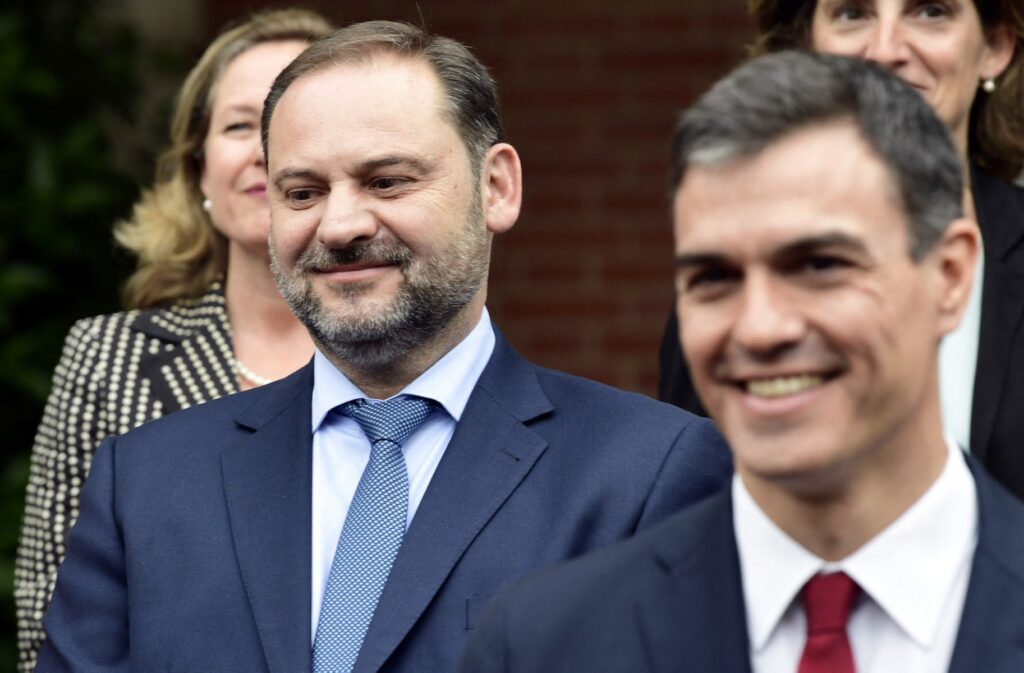
Then-Minister for Development Jose Luis Abalos (L) smiles as he poses with Spanish Prime Minister Pedro Sanchez in Madrid on June 8, 2018.
The Spanish government is facing one of the country’s worst corruption scandals to date.
Spain is ruled by a coalition of parties helmed by socialist PM Pedro Sánchez, held together by a shared commitment to assorted initiatives of civilization-killing wickedness—the political breakup of the country, the dissolution of anti-drug-trafficking bodies and border control, the extermination of working- and middle-class purchasing power, a war on farmers and rural life, the promotion of gender dysphoria in schools, etc.
In 2020, these initiatives included foisting one of the COVID-19 pandemic era’s most restrictive lockdowns on the Spanish people. And it seems repression and fear provided an opportunity for higher-ups in the Socialist Party (PSOE) to rob the taxpayer of his money as well as his freedom.
I will attempt to summarize the timeline as we now understand it, per the ongoing investigation by the country’s anti-corruption Prosecutor’s Office.
On the 20th of March 2020, the Spanish state issued its regulation on the purchase and distribution of masks to deal with the COVID-19 pandemic. This purchase was to be overseen by the Ministry of Development, and the new regulation stipulated that the state would purchase 8,000,000 masks through the State Ports Authority, which would then be reimbursed.
The very next day, Francisco Toledo, president of the Ports Authority, signed an agreement whereby all 8,000,000 masks were to be bought for €20,000,000 from a management firm by the name of Soluciones (as the Vozpópuli newspaper first reported on April 14th).
We now know, thanks to the country’s anti-corruption prosecutor’s office, that Soluciones had signed an agreement to source masks from two companies by the name of Comercial Cueto 92 and Comercial Cueto 92 Internacional on the 16th of March.
In other words, the firm knew the Spanish government was about to grant it the relevant contract.
At the head of this corruption scandal, we find the then-Minister of Development and right-hand man to PM Sánchez at the time, José Luis Ábalos. Ábalos is a primary school teacher who began his political career in the Communist Party and made it to vice-secretary for the Socialist Party.
He would eventually be dismissed from his ministerial and Socialist Party positions in July of 2021 and transferred to the position of President of the Interior Commission at Congress (“Comisión de Interior del Congreso”).
The reasons for his dismissal were, of course, not officially named, but as the corruption case detailed above came to light, the Spanish government tried to minimize the matter, pointing to supposedly similar corruption cases in the centre-Right PP, and scapegoating one Koldo Aguirre, former brothel and nightclub doorman and a long-time collaborator of Ábalos who the latter had assigned to the executive board of the Ports Authority.
That Koldo should be the mastermind of such an affair, and not a mere facilitator for the well-connected career politician Ábalos, however, proved to be a hard sell: thus the initial dismissal of Ábalos from his lofty perch in government when the case came to light.
It eventually became apparent that even keeping him in the “Comisión de Interior” would cost the government credibility, however, at which point Ábalos apparently threatened to air the party’s dirty laundry.
The attempt to build a firewall around this figure has not contained the scandal, because the ongoing investigation by the Anti-corruption Prosecutor’s Office is confirming the involvement of an array of politicians, from the municipal and regional to the ministerial level. Pretending that the issue begins and ultimately ends with Ábalos is further made untenable by reports that evidence of corruption was made known to the government and simply ignored before the case came to light.
Much of the corrosive policy mix that characterises Spain’s government and similar establishment Left platforms is lacquered in moralistic, ideological veneer.
The silver lining of the above scandal is that it is nakedly about greed, and, subsequently, the desire to hide corruption in government. It admits to no ideological justification and allows the public to see clearly the sorts of persons they are governed by.
It also reveals their shoddiness—their lack of planning and ability to hide their crimes in the long term—which should serve as an encouragement to expose the malevolence and incompetence of our ruling elites.
